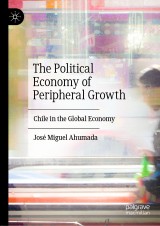Details

The Political Economy of Peripheral Growth
Chile in the Global Economy|
99,99 € |
|
| Verlag: | Palgrave Macmillan |
| Format: | |
| Veröffentl.: | 23.03.2019 |
| ISBN/EAN: | 9783030107437 |
| Sprache: | englisch |
Dieses eBook enthält ein Wasserzeichen.
Beschreibungen
<p></p><p>This book provides a political economy perspective on Chile’s contemporary economic development, explaining the different stages of Chile’s neoliberal pattern of economic integration into the global economy from 1973 to 2015. Three key explanatory variables are considered: the evolution of business-state relations, US geopolitical interest in the region through the waves of trade agreements, and the political impact of the dynamics of inflows and outflows of financial capital. Although Chile is typically considered to be a successful case of a free market economy, this book presents an alternative narrative of Chile’s growth through using a Latin American Structuralist political economy perspective. While it recognises the positive results in terms of growth, it also emphasises the lack of dynamic sources for long-term development, which embeds the economy into short-term booms followed by periods of stagnation.</p><p></p>
<p></p><p>Chapter 1. Introduction<b></b><b></b></p>
<p><b>PART I. Latin America in the global economy</b></p>
<p>Chapter 2. The political economy of development and integration: a structuralist perspective<b></b><b></b></p>
<p>Chapter 3. Latin America since the 1990s: deindustrialization, reprimarization and policy space restrictions<b></b><b></b></p>
<p><b>PART II. Chile: The political economy of peripheral growth </b></p>
<p>Chapter 4. The military dictatorship and the origins of peripheral growth<b></b><b></b></p>
Chapter 5. The rise and fall of peripheral growth: Chile during the 1990s<b></b><b></b><p></p>
<p>Chapter 6. Chile in the road to the commodity boom: deindustrialization without policy space<b></b></p>
<p>Chapter 7. Life after the commodity boom: the structure of contemporary peripheral development (2011 –2015)<b></b><b></b></p>
<p>Chapter 8. Conclusions: the mirages of the miracle</p><p></p>
<p><b>PART I. Latin America in the global economy</b></p>
<p>Chapter 2. The political economy of development and integration: a structuralist perspective<b></b><b></b></p>
<p>Chapter 3. Latin America since the 1990s: deindustrialization, reprimarization and policy space restrictions<b></b><b></b></p>
<p><b>PART II. Chile: The political economy of peripheral growth </b></p>
<p>Chapter 4. The military dictatorship and the origins of peripheral growth<b></b><b></b></p>
Chapter 5. The rise and fall of peripheral growth: Chile during the 1990s<b></b><b></b><p></p>
<p>Chapter 6. Chile in the road to the commodity boom: deindustrialization without policy space<b></b></p>
<p>Chapter 7. Life after the commodity boom: the structure of contemporary peripheral development (2011 –2015)<b></b><b></b></p>
<p>Chapter 8. Conclusions: the mirages of the miracle</p><p></p>
<p></p><p>José Miguel Ahumada is a Teaching Associate at the Department of Politics and Government in the Alberto Hurtado University, Chile. Dr Ahumada’s main research interests are in the areas of political economy of development in Latin America, comparative political economy and the history of economic thought.</p><p></p>
<p></p><p>This book provides a political economy perspective on Chile’s contemporary economic development, explaining the different stages of Chile’s neoliberal pattern of economic integration into the global economy from 1973 to 2015. Three key explanatory variables are considered: the evolution of business-state relations, US geopolitical interest in the region through the waves of trade agreements, and the political impact of the dynamics of inflows and outflows of financial capital. Although Chile is typically considered to be a successful case of a free market economy, this book presents an alternative narrative of Chile’s growth through using a Latin American Structuralist political economy perspective. While it recognises the positive results in terms of growth, it also emphasises the lack of dynamic sources for long-term development, which embeds the economy into short-term booms followed by periods of stagnation.</p><p></p>
<p>Explains the different stages of Chile's neoliberal pattern of economic integration into the global economy from 1973 through 2015</p><p>Uses a Latin American Structuralist perspective to discuss Chile's growth</p><p>Emphasizes the lack of dynamic sources for long-term development in the Chilean economy</p>
<p>“Jose Miguel Ahumada has written a very relevant and engaging book on the rise, propagation but also limits of free-market development in the context of emerging economies. Using an interesting blend of empirical analysis, history – including the history of ideas – and political economy, he sheds light on critical issues of stabilization, de-industrialization, inequality and pressure groups.” (Andres Solimano, author of Global Capitalism in Disarray (2017) and President, International Center of Globalization and Development)<br></p><p>“Chile is a transparent example of the potentials and limitations of a neo-liberal insertion into the world economy, especially of how a resource-rich emerging economy can get caught in the middle-income trap. Extractive industries and services can take advantage of niches of growth, but the ‘invisible hand’ have not been able to make this growth sustainable. This book provides an in-depth analysis of these phenomena and is a much needed contribution to the development literature.” (José Gabriel Palma, Emeritus Senior Lecturer, Faculty of Economics, University of Cambridge, UK)</p>

















